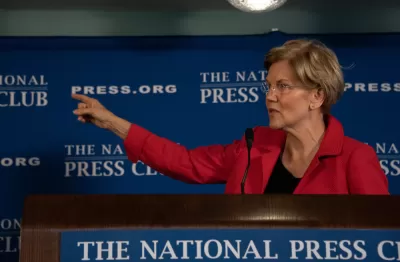Housing measures fared well in the 2018 election, and it's likely that Democratic contenders for the presidency in 2020 have taken notice and will boost those issues in their campaigns.

At the local and state levels, Patrick Sisson writes, ballot measures to address housing affordability and homelessness did well in 2018. "Many freshman members of Congress ran and won on platforms that addressed housing issues, including proposals to expand housing vouchers and increase funding for the national Housing Trust Fund."
After "decades of congressional inattention to an issue usually left to state and local governments," Sisson goes on, those results are likely to propel Democratic contenders for the presidency toward housing policy. That includes Senator Elizabeth Warren, who announced her candidacy on January 1, and Senator Kamala Harris, both of whom proposed housing bills last fall.
"With so many members of Congress running or considering a run, this year may see a number of additional housing proposals that double as positioning statements for candidates," Sisson writes. Time will tell whether those proposals amount to anything concrete. Meanwhile, says National Low Income Housing Coalition president Diane Yentel, "The incoming Congress will have several opportunities to increase federal funding for affordable housing solutions: [...] a potential budget deal, housing finance reform, or even a possible infrastructure spending package."
FULL STORY: Will housing issues gain traction in 2020 election?

Planetizen Federal Action Tracker
A weekly monitor of how Trump’s orders and actions are impacting planners and planning in America.

Congressman Proposes Bill to Rename DC Metro “Trump Train”
The Make Autorail Great Again Act would withhold federal funding to the system until the Washington Metropolitan Area Transit Authority (WMATA), rebrands as the Washington Metropolitan Authority for Greater Access (WMAGA).

DARTSpace Platform Streamlines Dallas TOD Application Process
The Dallas transit agency hopes a shorter permitting timeline will boost transit-oriented development around rail stations.

Affordable Housing Finance 101
The financial intricacies involved in building affordable housing can be difficult to understand. This explainer breaks down the foundational concepts.

San Francisco's School District Spent $105M To Build Affordable Housing for Teachers — And That's Just the Beginning
SFUSD joins a growing list of school districts using their land holdings to address housing affordability challenges faced by their own employees.

Car-Centric LA Suburb Looks to a Train-Oriented Future
City leaders in Rancho Cucamonga, the future western terminus of the Brightline West rail line to Las Vegas, want to reimagine the city as a transit-oriented, pedestrian-friendly community.
Urban Design for Planners 1: Software Tools
This six-course series explores essential urban design concepts using open source software and equips planners with the tools they need to participate fully in the urban design process.
Planning for Universal Design
Learn the tools for implementing Universal Design in planning regulations.
Municipality of Princeton
Roanoke Valley-Alleghany Regional Commission
City of Mt Shasta
City of Camden Redevelopment Agency
City of Astoria
Transportation Research & Education Center (TREC) at Portland State University
US High Speed Rail Association
City of Camden Redevelopment Agency
Municipality of Princeton (NJ)





























